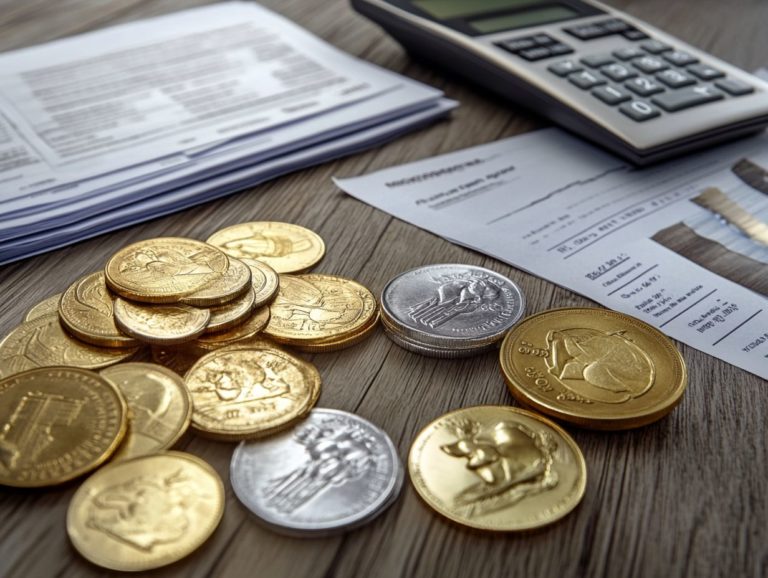Tax Implications of Precious Metals in Family Businesses
In the realm of family businesses, precious metals can be a dual-edged sword serving as both a valuable asset and a complex financial instrument.
Get ready to explore the exciting world of precious metals and their impact on family businesses! Grasping their various uses, tax implications, and legal considerations is essential for effective management and long-term success.
This guide delves into the multifaceted role of precious metals, covering everything from practical applications to the taxes they may incur.
You’ll discover strategic approaches designed to maximize benefits while minimizing risks, along with key legal frameworks and asset protection strategies. As you navigate the intricacies of incorporating precious metals into your family business, you ll be well-equipped for the journey ahead.
Contents
- Key Takeaways:
- Why Precious Metals Matter for Your Family Business
- Navigating Taxes on Precious Metals
- Tax Strategies for Handling Precious Metals
- Legal Considerations for Family Businesses
- Protecting Assets and Wealth
- Frequently Asked Questions
- What are the tax implications of owning precious metals in a family business?
- Are there any tax advantages to having precious metals in a family business?
- Do I need to report precious metals held in a family business on my tax return?
- Can I use precious metals in my family business as a tax deduction?
- Do I need to pay sales tax on precious metals held in a family business?
- Are there any inheritance or gift tax implications for passing down precious metals in a family business?
Key Takeaways:
- Knowing the types and uses of precious metals is crucial for family businesses to understand their potential tax implications.
- Use smart tax strategies to boost benefits and cut risks associated with owning and utilizing precious metals in a family business.
- Incorporating precious metals into business structures and protecting them through insurance and estate planning can help safeguard family business assets and wealth.
Why Precious Metals Matter for Your Family Business
Understanding precious metals in family businesses is essential for protecting wealth, especially during uncertain economic times. These metals, such as gold and silver, serve not only as a hedge against inflation but also as valuable investment assets that can enrich your portfolio.
By leveraging physical holdings of precious metals, family businesses can make informed investment decisions. This approach helps you effectively navigate market volatility, which refers to the fluctuations in the price of assets, and secure financial stability. Understanding the tax implications of investing in precious metals ETFs can further enhance your investment strategy.
Overview of Precious Metals and Their Uses
Precious metals, particularly gold and silver, have captivated attention not only for their exquisite beauty but also for their intrinsic value as financial securities and investment vehicles.
These metals have transcended time and geography, finding a revered place in both ancient cultures and contemporary marketplaces. Gold, in particular, has long been regarded as a safe haven during economic turmoil, preserving its value across generations.
In today s landscape, both gold and silver are critical in diverse investment portfolios. They provide a reliable hedge against inflation and currency fluctuations.
Products such as gold bullion and rare coins act as tangible assets that appeal to both novice and seasoned traders. This further solidifies their position in modern trading environments. The persistent demand for these metals highlights their significance not just as investments, but as vital components of the global financial system.
The tax implications for family businesses engaged in precious metals can be quite intricate. It s essential to navigate the various tax liabilities carefully, as overlooking any detail could lead to complications with the IRS.
Understanding these nuances helps you avoid potential pitfalls and ensures your business remains compliant.
Types of Taxes and How They Apply
Understanding the different types of taxes that apply to precious metals, such as capital gains tax the tax on the profit from selling assets and sales tax, is vital for you to meet your tax responsibilities accurately.
These taxes can significantly impact your trading decisions and overall financial strategies. For example, capital gains tax is imposed on the profits you make from selling assets like gold coins and silver bars, dictating how much you actually keep after a sale. Additionally, understanding inheritance taxes on precious metals is crucial, as it can also affect your investment decisions. Similarly, sales tax can come into play when you purchase these precious metals, adding to your initial investment costs.
Don’t overlook estate taxes, as they influence the inheritance of precious metal assets when an owner passes away. Navigating these various tax obligations is essential for understanding the role of precious metals in your tax strategy and ensuring you remain compliant with regulatory requirements.
Tax Strategies for Handling Precious Metals
Implementing effective tax strategies for managing precious metals is crucial for optimizing investment growth and minimizing capital losses in family businesses.
By strategically navigating the complexities of taxation, you can significantly enhance the financial performance of your investments.
For personalized advice regarding your investments in precious metals, consider consulting with financial advisors or tax professionals familiar with tax considerations for precious metals in family trusts.
Maximizing Tax Benefits and Minimizing Risks
Maximizing tax benefits while minimizing risks associated with precious metal transactions requires a thorough understanding of your tax obligations and potential deductions. For family businesses, partnering with a skilled financial advisor can unveil unique strategies specifically tailored to your situation.
This collaboration allows you to pinpoint applicable deductions related to business expenses, investment losses, and even charitable contributions. A knowledgeable advisor guides you in structuring transactions to comply with current tax regulations, including tax strategies for precious metals in uncertain economies, while protecting your assets.
By taking active steps, such as utilizing retirement accounts for investments in precious metals, family businesses can significantly lower their taxable income and confidently navigate the intricate tax landscape.
Legal Considerations for Family Businesses
Navigating the legal landscape for family businesses involved with precious metals is crucial to ensure adherence to laws and regulations that can profoundly influence your investment assets.
Understanding these considerations not only safeguards your business but also enhances your strategic decision-making in this valuable sector.
Incorporating Precious Metals into Business Structures
Incorporating precious metals into your business structure demands a thoughtful approach, particularly regarding tax implications and investment strategies aimed at maximizing your financial security.
You can explore various legal entities like limited liability companies (LLCs), partnerships, or corporations. Each offers distinct characteristics influencing how precious metals are managed, including the tax benefits of holding precious metals in a trust.
For instance, an LLC provides flexibility in asset management and distribution, while a corporation might open doors to specific tax strategies that can be advantageous. Evaluating these options requires a keen understanding of the benefits and drawbacks tied to each structure.
This evaluation is especially important regarding potential capital gains tax, which is tax on profits from the sale of assets, and estate tax, which is tax on the transfer of wealth after death. Engaging a knowledgeable financial advisor is essential, as they can guide you through these complexities.
Such guidance ensures not just compliance with legal requirements but also proactive asset management that aligns with your long-term financial ambitions.
Protecting Assets and Wealth
To safeguard assets and wealth in family businesses that encompass precious metals, it is essential to adopt an active plan. This involves a meticulous approach to insurance and thorough estate planning, ensuring that your legacy is both protected and well-organized for future generations.
Insurance and Estate Planning for Precious Metals
Insurance and estate planning for precious metals are essential components in protecting your inherited gold and maximizing your investment growth while meeting tax obligations.
Having the right insurance coverage shields these valuable assets from unforeseen events like theft or damage, ensuring their value remains intact over time. Additionally, implementing tax strategies for precious metals in high-inflation environments along with thoughtful estate planning facilitates the smooth transfer of these assets to future generations, minimizing potential disputes and tax burdens.
Understanding how these elements interplay can greatly enhance your portfolio’s overall management. By implementing effective strategies, you position yourself for fruitful outcomes.
Act now to ensure your family maintains and even grows their gold investments, providing financial stability and a lasting legacy for years to come.
Frequently Asked Questions
What are the tax implications of owning precious metals in a family business?
The tax implications of owning precious metals in a family business may vary depending on the type of business and the specific metals being held. Generally, precious metals are subject to capital gains tax when sold or exchanged for cash or other assets.
Are there any tax advantages to having precious metals in a family business?
In some cases, there may be tax advantages to holding precious metals in a family business. If the business is set up as an S corporation or partnership, the income from the precious metals may pass through to individual owners at a lower tax rate.
Do I need to report precious metals held in a family business on my tax return?
If you own a family business with precious metals, you must report this on your tax return. Consult a tax professional to learn the reporting rules for your case.
Can I use precious metals in my family business as a tax deduction?
You generally can’t use precious metals held in a family business as a tax deduction. However, if they’re used in manufacturing or as inventory, some deductions may apply.
Do I need to pay sales tax on precious metals held in a family business?
Sales tax usually doesn’t apply to precious metals held in a family business. But, if you sell them to buy goods or services, sales tax could be charged on those purchases.
Are there any inheritance or gift tax implications for passing down precious metals in a family business?
Passing down precious metals in a family business might involve inheritance or gift tax. Consult a tax expert to understand the potential tax implications in your area.
If you have more questions about your specific situation, reach out for personalized tax advice!













